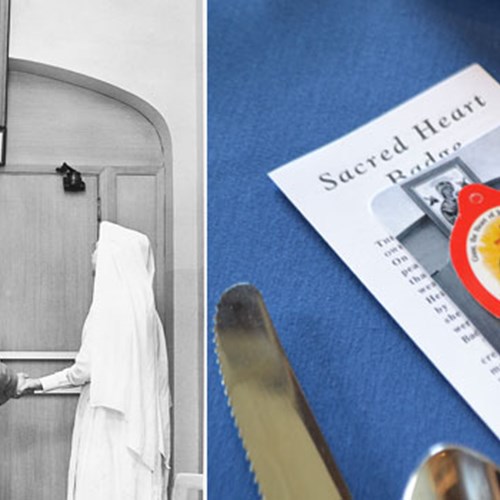Outpatient Addiction Treatment Services at Rosary Hall
Call today: 216-363-2580

ROSARY HALL OVERVIEW
Freedom from Addiction
The battle to be free from alcohol or drug dependency is never easy, but it can be won. At Rosary Hall, patients and their families find the road to freedom in a recovery process that’s compassionate, comprehensive and one of the best in the country.
Treatment That’s Just for You
Every patient has unique needs in his or her personal battle to break the stronghold of addiction. Through an individual evaluation, we will determine where you are in the addiction process and develop a comprehensive, individualized plan that combine’s today’s cutting edge treatment options with a compassionate, human touch. Tailoring a plan to fit each individual is an essential component to returning to a life free from addiction.
Expertise at Every Step
An effective treatment program involves many steps and a commitment from each patient. That’s why Rosary Hall provides a continuum of care founded on the 12-step, abstinence-based model. This continuum of care seamlessly transitions patients through a process of outpatient rehabilitation and into community-based support networks.
Our Experts
Ted Parran Jr., MD, FACP
Co-Medical Director of Rosary Hall
Addiction Medicine
Mykola Kolganov, MD
Co-Medical Director of Rosary Hall
Addiction Medicine
Proven Care, Conveniently Located
Located in the heart of downtown Cleveland, Rosary Hall offers convenient access to care for those living and working in the city, as well as its surrounding suburbs.
QUESTIONS?
Call Rosary Hall at 216.363.2580.
For non-emergency situations, please feel welcome to email us at info@stvincentcharity.com.
Treatment Services
Innovative treatments, personalized care plans, intensive outpatient rehabilitation and groundbreaking addiction treatment research are among the many staff-driven efforts at Rosary Hall. Key services, include:
Intake services
Provides information, intake and referrals for all Rosary Hall services and programs.
Medical evaluations and ongoing assessments
Individuals are evaluated during a face-to-face session to determine the nature and extent of their misuse and/or addiction to alcohol and other drugs.
Intensive outpatient
Intensive outpatient programs can be attended during the day or evening and provide primary rehabilitation services to patients who do not require hospitalization. The program typically includes four group sessions per week for five weeks.
“Rosary Hall is a great program and I’m grateful I was able to be a part of it. The staff was very understanding and helpful. I learned so much about being an alcoholic, as well as information on how to recover successfully. I liked the group meetings and layout plan for giving me the tools that are needed to recover. The staff makes you feel confident and I’m just so grateful I have had the chance to change my life through Rosary Hall.”
Individual counseling
One-on-one meetings with a counselor or social worker to assist in achieving treatment objectives.
Aftercare
Patients who have completed a primary rehabilitation program typically continue treatment in early recovery in the aftercare program. This is a one-hour-per-week group therapy program lasting a minimum of 12 weeks.
“I am so grateful that I came to Rosary Hall. At first I thought that I wouldn’t learn much because I had been through recovery programs before. But, I learned so much about myself and my feelings. This program has helped me to open up and share some things that I was never comfortable sharing before. The group sessions are great and meditation was a great way for me to start my day. I came to class feeling anxious on most day, but by the time I left I felt calm and motivated to get through the rest of my day sober. Thank you! This program has truly been a blessing!”
CASE-MANAGED TRANSITION INTO COMMUNITY AND SUPPORT NETWORKS
We assist patients in moving from treatment at Rosary Hall to self-help recovery programs, such as Alcoholics Anonymous or Narcotics Anonymous. Case management is also provided to transition individuals to the next level of care and to other support services.
MEDICATION-ASSISTED TREATMENT
Medication-assisted treatment (MAT) is the use of medications, in combination with counseling and behavioral therapies, to provide a whole-patient approach to the treatment of substance use disorders. At Rosary Hall, our MAT program uses Vivitrol, Suboxone or Sublocade for treatment, and the program is available to all patients, including with private insurance and Medicaid. The ultimate goal of MAT is full recovery, including the ability to live a self-directed life.
A Legacy of Compassion and Excellence
Founded in 1952, Rosary Hall has been at the forefront of treating alcoholism and drug dependency for more than 60 years.
In fact, its founder, Sister Ignatia Gavin, worked hand-in-hand with Dr. Robert Smith after he co-founded Alcoholics Anonymous in Akron, Ohio. Today, Rosary Hall’s innovative efforts continue to be fueled not only by decades of proven experience in treating more than 100,000 men and women, but also by the compassion that is a hallmark of St. Vincent Charity.

Legacy of Sr. Ignatia Gavin, CSA, Founder of Rosary Hall
In 1952, a tiny 63-year-old nun undertook a formidable assignment – move from Akron to Cleveland to serve alcoholics at St. Vincent Charity Medical Center. Sister Ignatia had previous experience treating alcoholics at Akron’s St. Thomas Hospital, where she worked with Robert H. Smith, MD, co-founder of Alcoholics Anonymous. Revered as the “Angel of Mercy,” Sister Ignatia worked tirelessly raising money for Rosary Hall and treating patients until her retirement in 1965. By that time, Rosary Hall was considered one of the finest treatment centers in the nation. Sister Ignatia leaves a legacy of caring devotion to more than 20,000 alcoholics during her life.
Sacred Heart Badge
The Sacred Heart Badge is given to all those who participate and complete Rosary Hall treatment programs. The familiar badge owes its origin to St. Margaret Mary. On one occasion, Christ appeared to her, he expressed the wish that those who loved him should wear or carry a picture of his Sacred Heart. St. Margaret Mary responded by making some little pictures which she and her friends carried. These were really the first Sacred Heart Badges.
The Sacred Heart Badge symbol serves to remind us of Christ’s love for each of us. The Badge has proven to be a comfort, an inspiration, a source of spiritual strength as a sacramental or visible sign by which God’s benediction is invoked on the person who has one.
When Sr. Ignatia Gavin, founder of Rosary Hall, worked at Rosary Hall, she presented every client with a Sacred Heart Badge upon completion of the program. Rosary Hall still keeps this Sr. Ignatia’s tradition alive and well today.
We believe that people heal people.
That’s why Rosary Hall places great emphasis on the development of its staff. Led by two of the leading physicians in addiction medicine, our team of chemical dependency nurses, counselors, social workers, recovery coaches, case manager and volunteers form the Rosary Hall family.
God grant me the serenity to accept the things I cannot change, the courage to change the things I can and the wisdom to know the difference.
—
the addicted brain: A presentation by Dr. Ted Parran, associate medical director of rosary hall
Questions?
We’d love to hear from you. Email us at info@stvincentcharity.com or call Rosary Hall at 216.363.2580.
Questions?
Call Rosary Hall at 216-363-2580.
Also, for non-emergency situations, feel welcome to email us at info@stvincentcharity.com.





